Find Help
More Items From Ergsy search
-
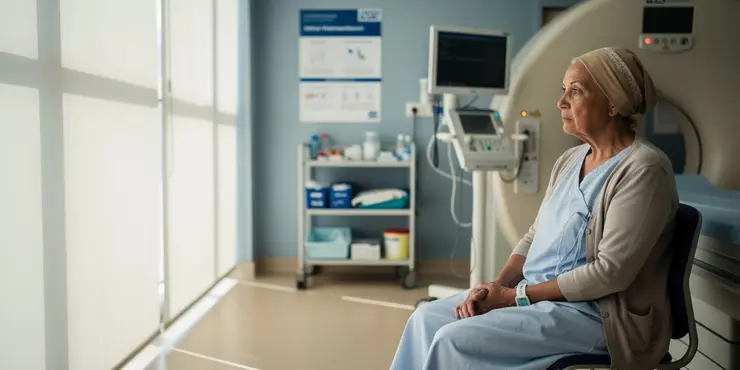
Having radiotherapy for breast cancer - 3 Videos
Relevance: 100%
-
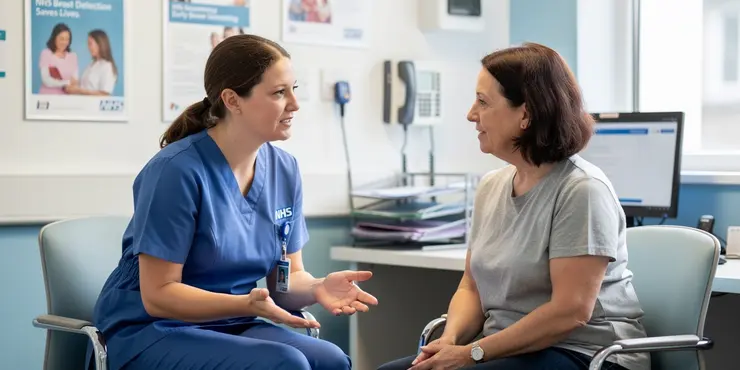
Breast cancer: testing and treatment | NHS
Relevance: 71%
-
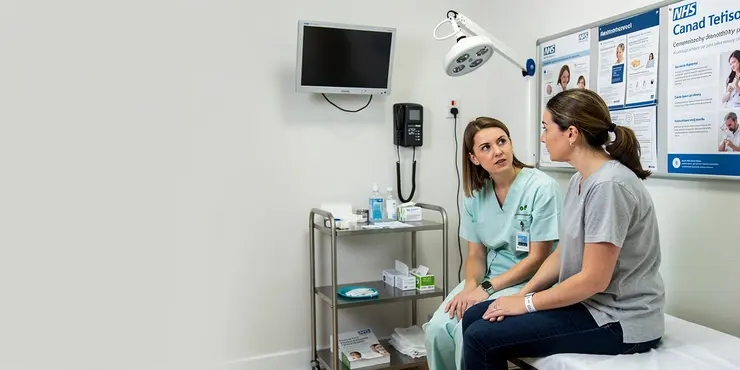
What is Radiotherapy, and its use in treatment for cancers?
Relevance: 69%
-
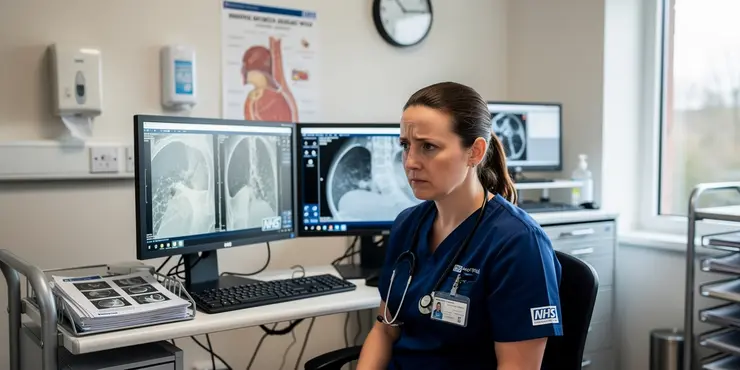
AI Breast Cancer Screening in the UK
Relevance: 62%
-
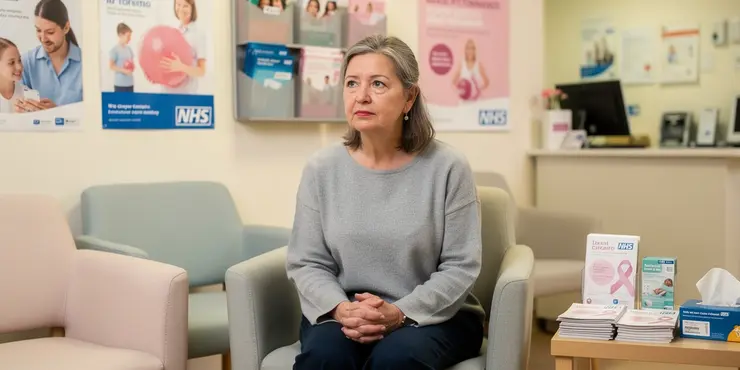
NHS breast cancer screening
Relevance: 61%
-
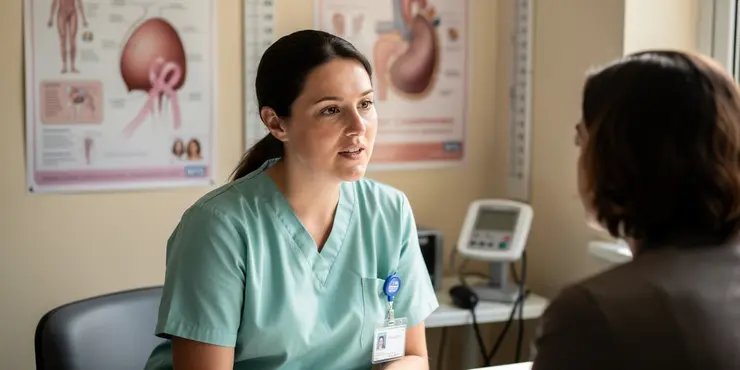
About Breast cancer - signs and symptoms | NHS
Relevance: 60%
-
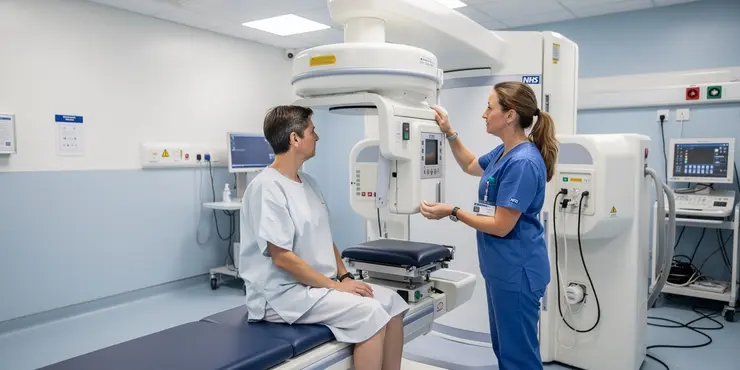
Cancer treatment: what happens during radiotherapy? | NHS
Relevance: 58%
-
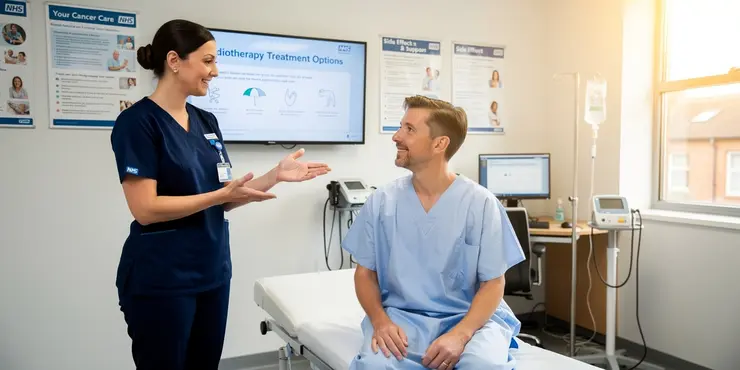
Royal Berkshire NHS Foundation Trust: Radiotherapy for prostate cancer
Relevance: 58%
-
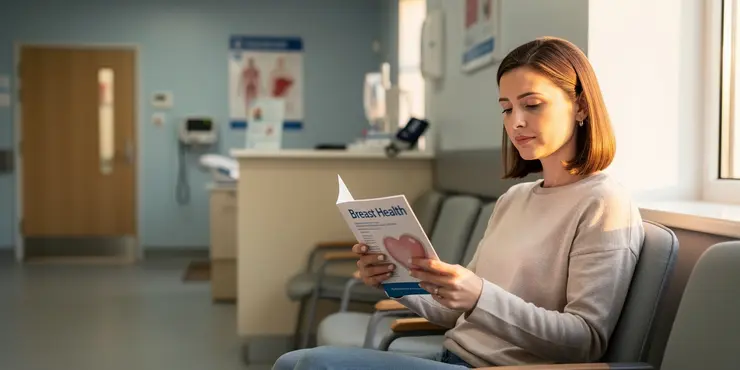
I've found a lump in my breast - What happens next? The breast diagnostic clinic
Relevance: 57%
-
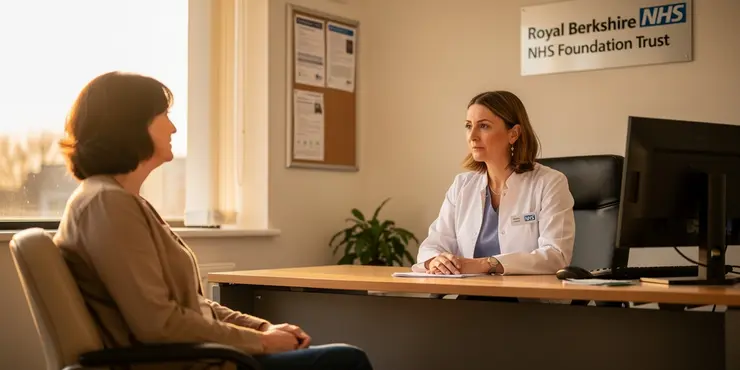
Royal Berkshire NHS Foundation Trust: Radiotherapy for head and neck cancers
Relevance: 55%
-
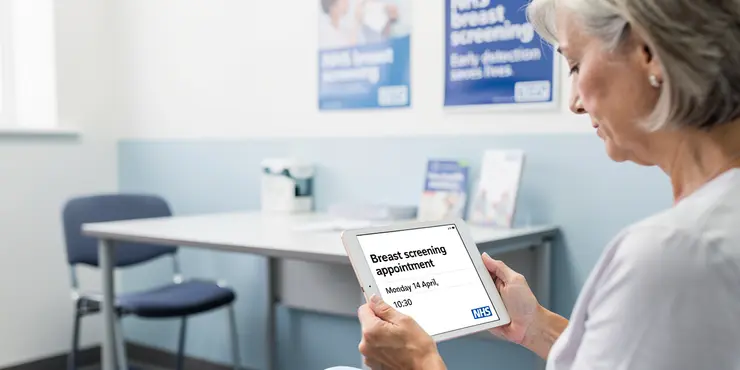
How often should I get screened for breast cancer?
Relevance: 54%
-
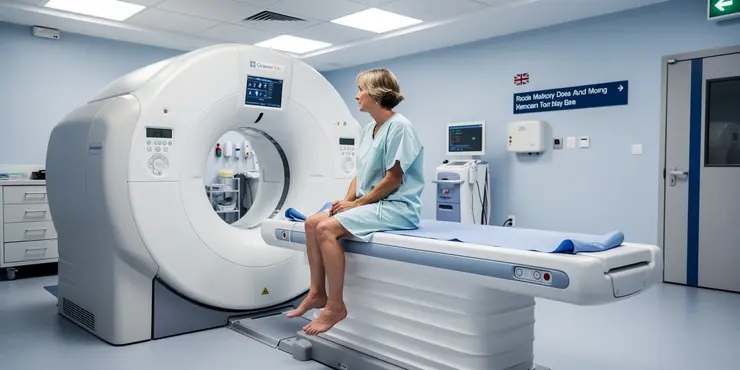
Radiotherapy CT scanner
Relevance: 53%
-
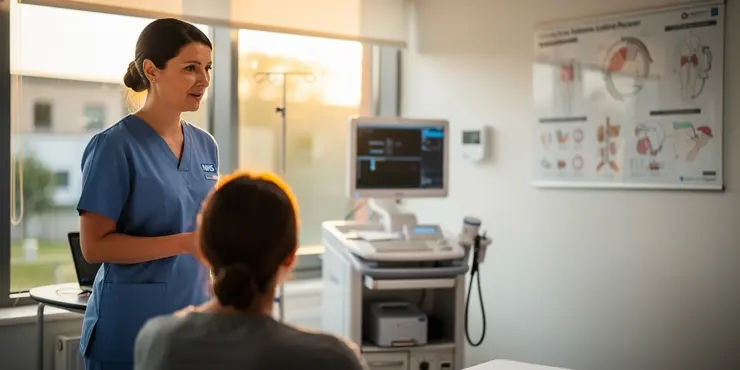
Radiotherapy Services at University Hospital
Relevance: 51%
-
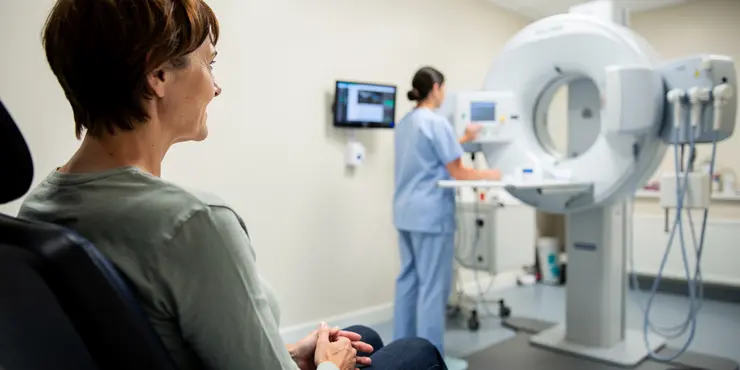
Radiotherapy to the Head and Neck: A Guide for patients and their carers
Relevance: 50%
-

I've found a lump in my breast - What happens next? The breast diagnostic clinic
Relevance: 48%
-
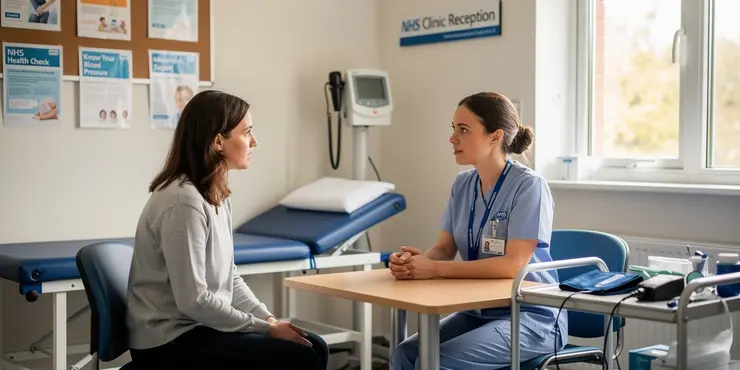
A Radiotherapy appointment in east and North Hertfordshire
Relevance: 46%
-
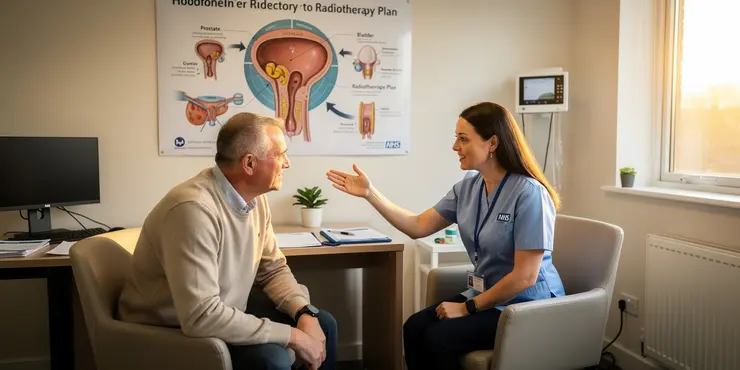
What is it like having Prostate Radiotherapy treatment?
Relevance: 46%
-
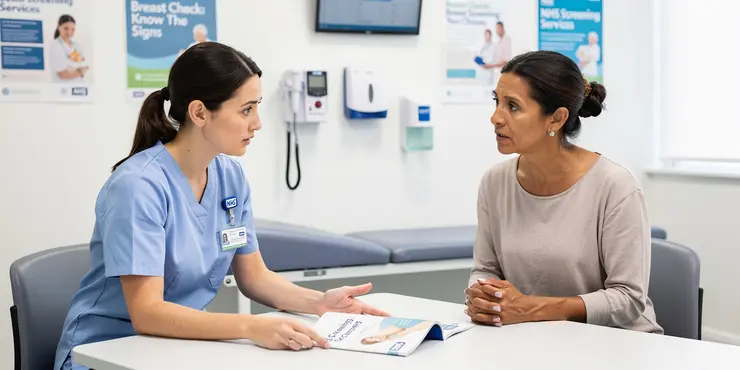
Other Things You Need to Know About Breast Screening
Relevance: 44%
-
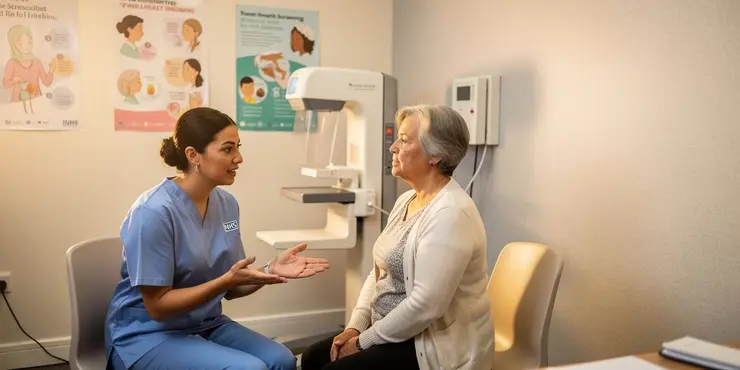
Tower Hamlets breast screening programme
Relevance: 44%
-
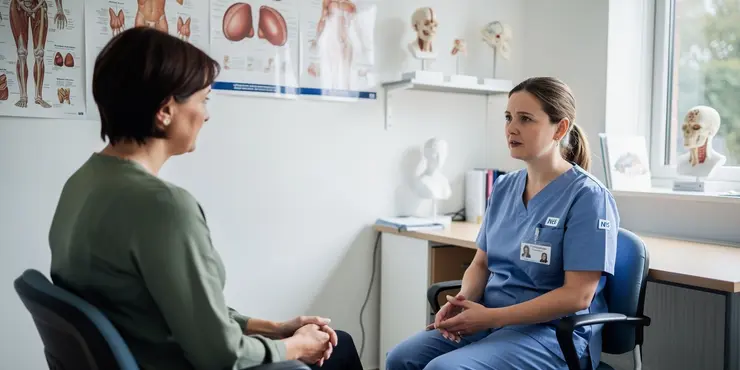
What is Breast augmentation?
Relevance: 42%
-
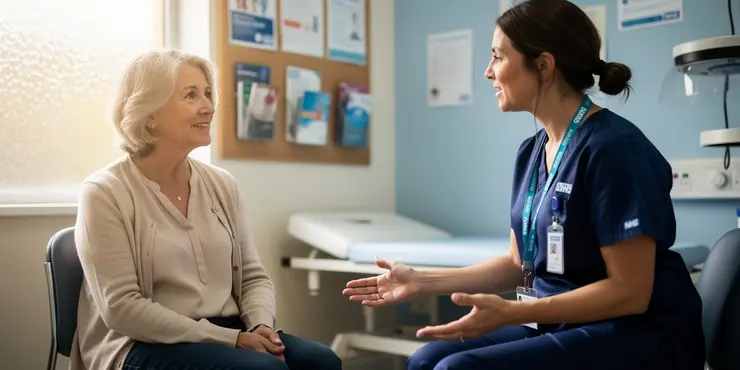
Can I have a mammogram if I have breast implants?
Relevance: 42%
-

Treating breast pain | United Lincolnshire Hospitals NHS Trust
Relevance: 40%
-
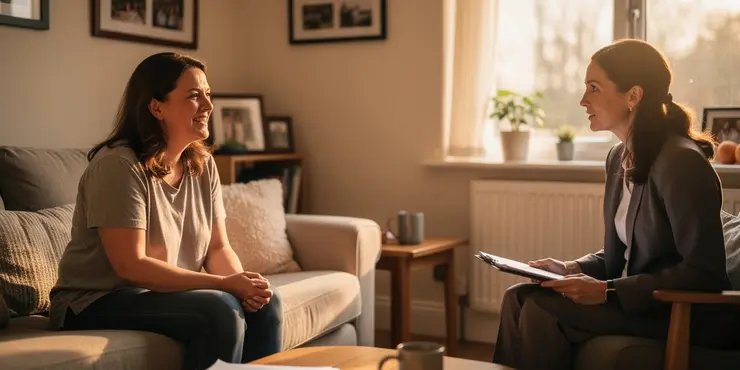
Evidence-Based Interventions: breast reduction
Relevance: 39%
-
Breasts and Mastitis
Relevance: 37%
-
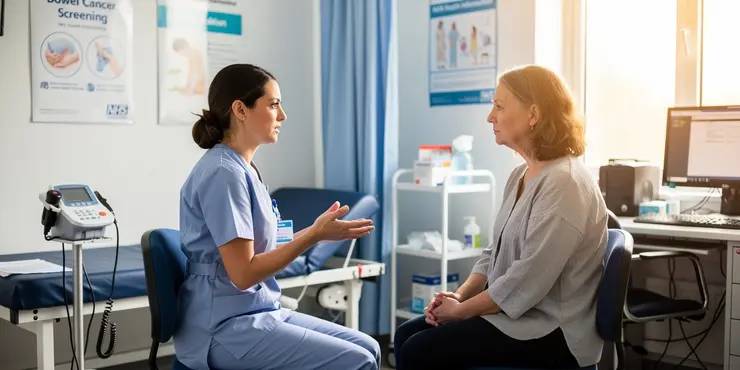
What kinds of cancer screening are available?
Relevance: 36%
-
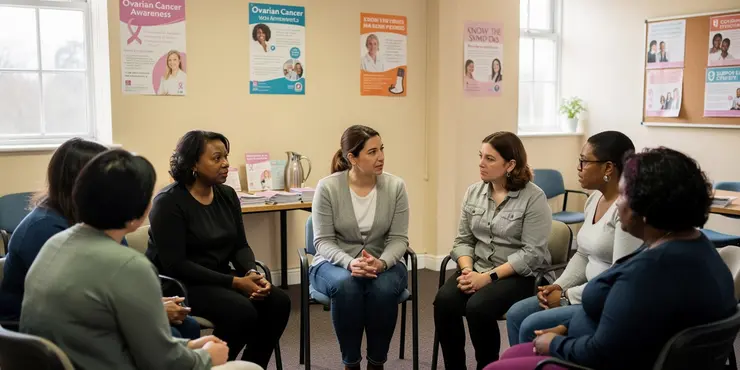
Raising awareness of ovarian cancer
Relevance: 33%
-
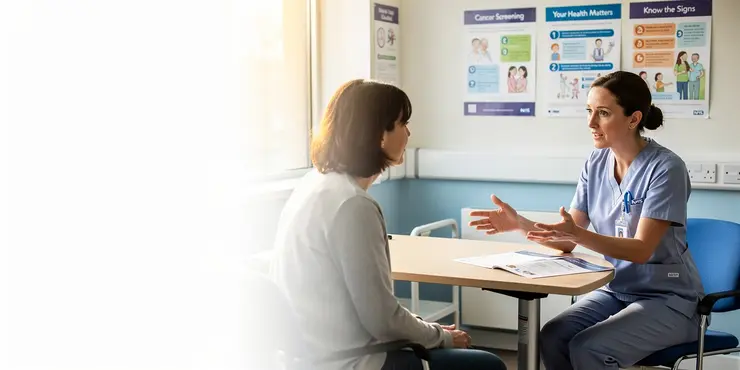
What is cancer screening?
Relevance: 33%
-
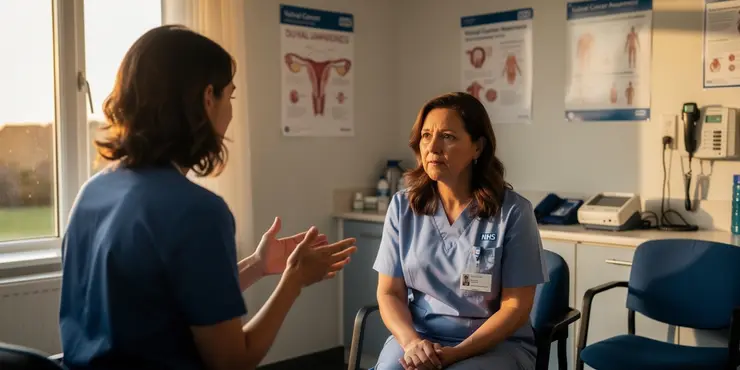
Vulval Cancer
Relevance: 33%
-

What are the symptoms of testicular cancer?
Relevance: 32%
-
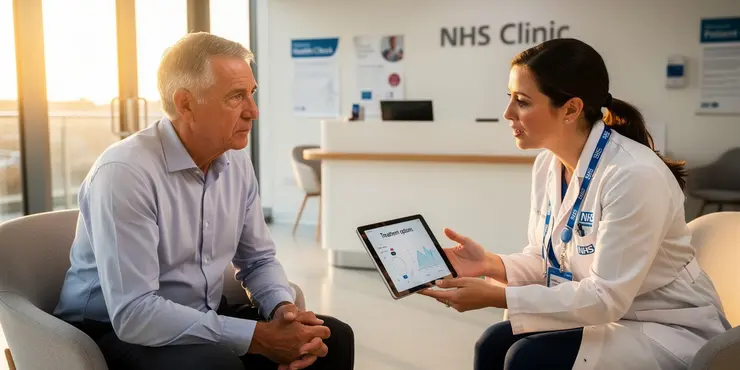
How is prostate cancer treated?
Relevance: 31%
-
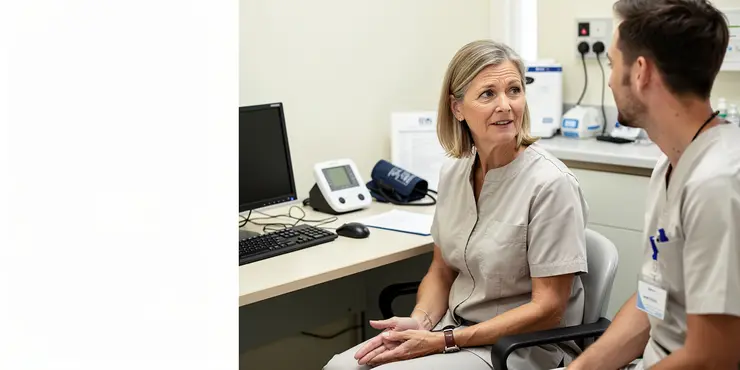
Ovarian Cancer
Relevance: 31%
-
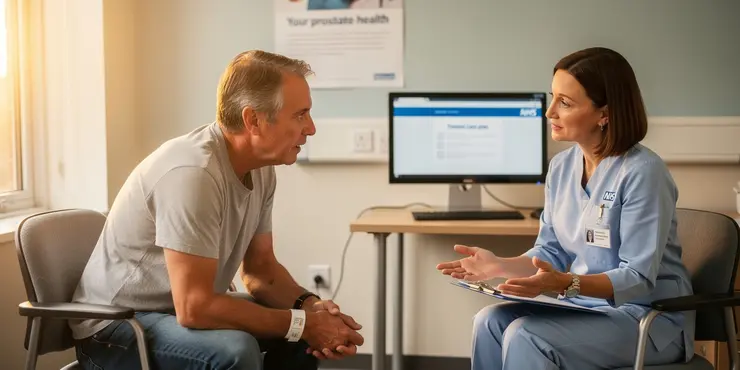
Treating prostate cancer
Relevance: 31%
-
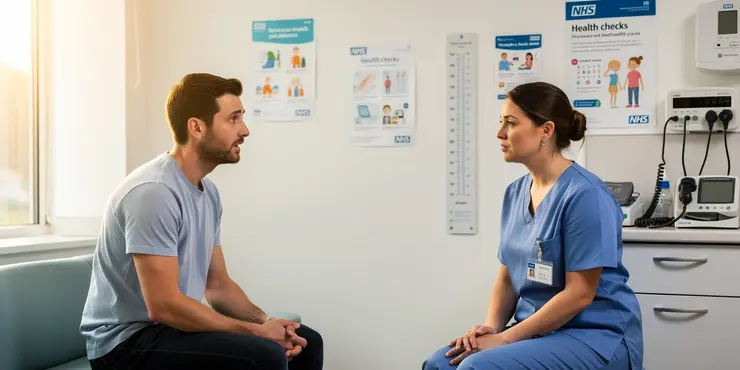
Can men have mammograms?
Relevance: 30%
-

What are the benefits of regular mammograms?
Relevance: 30%
-
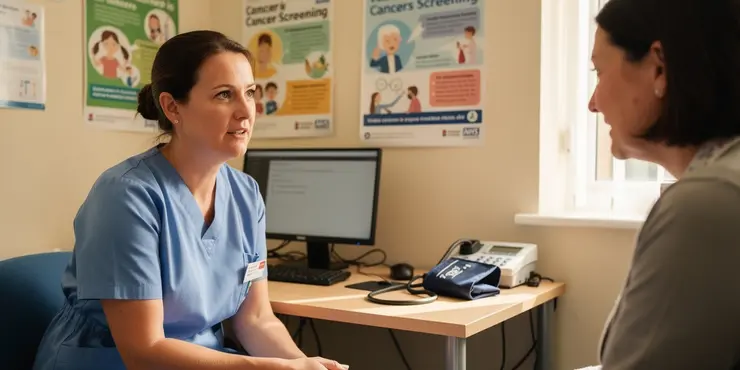
Are there any risk factors that increase the need for cancer screening?
Relevance: 29%
-
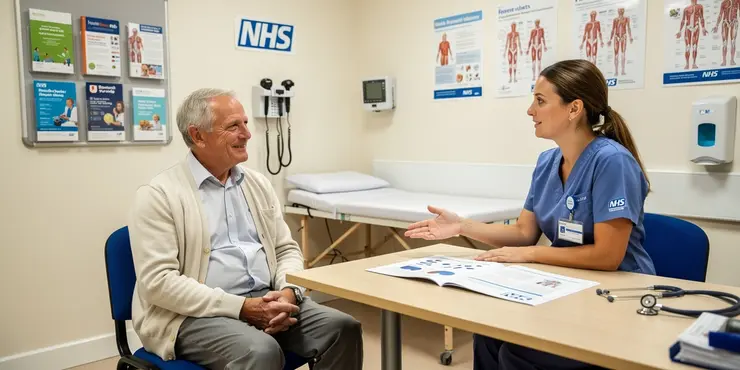
How is advanced prostate cancer treated?
Relevance: 29%
-

What is Cancer?
Relevance: 29%
-
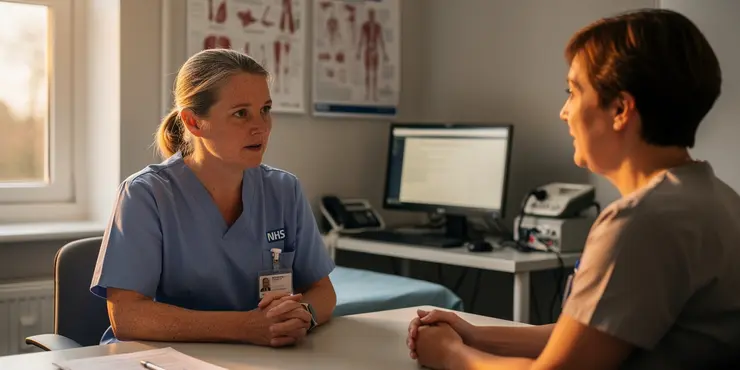
Endometrial Cancer
Relevance: 29%
-
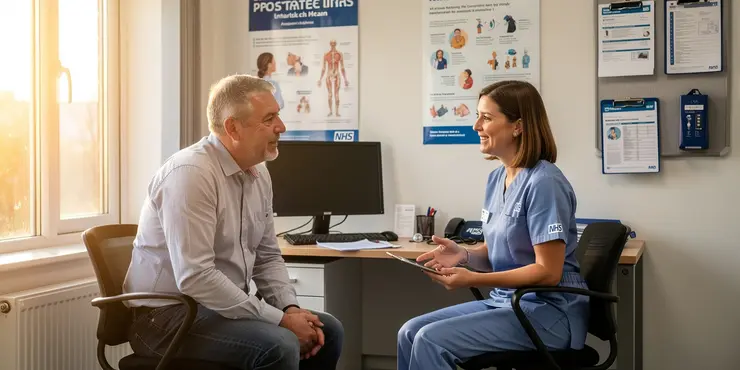
Can Abiraterone be used for early-stage prostate cancer?
Relevance: 29%
-
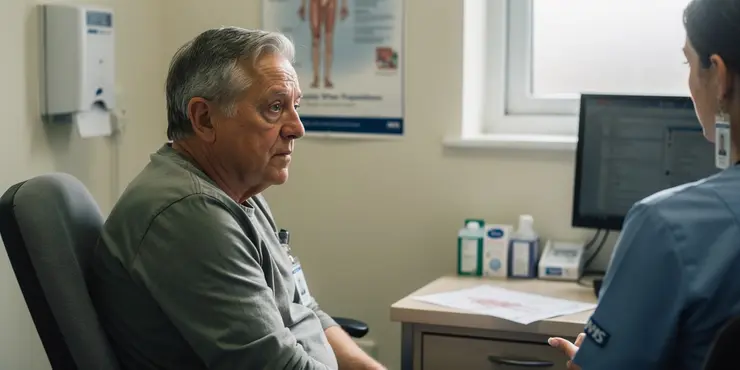
Hormone Therapy for prostate cancer
Relevance: 29%
What is radiotherapy, and how does it work in treating breast cancer?
Radiotherapy, also known as radiation therapy, is a medical treatment that uses high-energy rays or particles to target and destroy cancer cells in the breast. It works by damaging the DNA within cancer cells, preventing them from growing and dividing.
Who typically receives radiotherapy as part of their breast cancer treatment?
Radiotherapy is often recommended for breast cancer patients after breast-conserving surgery (lumpectomy) or mastectomy, depending on various factors such as tumor size, lymph node involvement, and cancer stage.
What are the goals of radiotherapy in breast cancer treatment?
The primary goals of radiotherapy in breast cancer treatment are to eradicate any remaining cancer cells in the breast area, reduce the risk of cancer recurrence, and improve overall survival rates.
Is radiotherapy always necessary for breast cancer patients?
No, radiotherapy is not always necessary for every breast cancer patient. The decision to include radiotherapy in the treatment plan depends on the individual's specific case and medical factors.
How is the decision made regarding whether a breast cancer patient needs radiotherapy?
The decision is based on various factors, including the stage of cancer, tumor size, lymph node involvement, and the patient's overall health. A multidisciplinary team of doctors will assess these factors to determine the most appropriate treatment plan.
What types of radiotherapy are used for breast cancer?
External beam radiotherapy (EBRT) and brachytherapy are the two primary types of radiotherapy used for breast cancer treatment.
What is external beam radiotherapy, and how is it administered for breast cancer?
External beam radiotherapy delivers radiation from outside the body using a machine (linear accelerator). Patients typically receive daily treatments over several weeks, with the radiation precisely targeted at the breast or chest area.
Can internal radiation therapy (brachytherapy) be used for breast cancer treatment?
Brachytherapy involves placing radioactive sources directly inside or near the tumor site. While less common, it can be used in select cases of breast cancer.
What are the potential side effects of radiotherapy for breast cancer?
Common side effects include fatigue, skin changes (redness, itching), breast swelling or tenderness, and temporary changes in breast appearance. Rare side effects may include damage to the heart or lungs.
How long does a typical course of breast cancer radiotherapy last?
The duration of radiotherapy varies but typically lasts 3 to 6 weeks, with daily sessions lasting a few minutes.
What is the schedule for radiotherapy sessions, and how often are they done?
Radiotherapy sessions are usually scheduled 5 days a week, with weekends off. The exact schedule and number of sessions depend on the treatment plan.
Are there any lifestyle or dietary restrictions during breast cancer radiotherapy?
Patients may be advised to avoid specific skincare products, such as perfumes and lotions, on the treated area. Dietary restrictions are generally not necessary.
What is the importance of accurate radiation targeting in breast cancer treatment?
Precise targeting is crucial to minimize damage to healthy tissues surrounding the breast while effectively treating the cancerous cells.
Is breast reconstruction possible after radiotherapy, and if so, when is it recommended?
Breast reconstruction is possible after radiotherapy, but it may be delayed until after completion of radiotherapy to ensure better cosmetic outcomes.
Can radiotherapy affect fertility in breast cancer patients?
Radiotherapy to the breast area does not typically affect fertility directly, but it's essential to discuss fertility preservation options with your healthcare team before starting treatment.
What precautions should breast cancer patients take during and after radiotherapy?
Patients should follow their doctor's instructions carefully, attend all scheduled appointments, and report any side effects promptly. After treatment, regular follow-up visits are essential for monitoring and managing potential long-term effects.
How can patients manage radiation-induced skin changes and discomfort?
Patients can use recommended skincare products and techniques to manage skin changes, and pain medications can help alleviate discomfort. It's essential to consult with the healthcare team for specific guidance.
Are there any long-term effects or risks associated with breast cancer radiotherapy?
While the risk of long-term effects is relatively low, potential complications may include radiation fibrosis (thickening of breast tissue) and a slight increase in the risk of heart or lung problems, particularly in left-sided breast cancer cases.
Can radiotherapy be used in combination with other breast cancer treatments like chemotherapy or surgery?
Yes, radiotherapy can be combined with other treatments, and the sequencing of treatments will depend on the patient's specific case and treatment plan.
What resources and support are available for breast cancer patients undergoing radiotherapy?
Patients can access support groups, counseling services, and educational materials through cancer centers, hospitals, and online resources. Additionally, family and friends can provide valuable emotional support during the treatment journey.
Having Radiotherapy for Breast Cancer - 3 Informative Videos
Introduction
Radiotherapy is a common and effective treatment for breast cancer, harnessing high-energy radiation to target and destroy cancer cells. For many individuals in the United Kingdom, understanding the process and what to expect can be instrumental in alleviating anxiety and preparing for treatment. To aid in this, we present three informative videos that comprehensively cover different aspects of radiotherapy for breast cancer.
Video 1: Understanding Radiotherapy for Breast Cancer
The first video serves as an introduction to radiotherapy, explaining its purpose and how it works to treat breast cancer. It delves into the science behind the treatment, including the use of X-rays and gamma rays to pinpoint and destroy cancer cells while minimizing harm to surrounding healthy tissue. This video is essential for anyone new to the concept of radiotherapy and provides a solid foundation of knowledge.
Video 2: The Radiotherapy Process in the UK
The second video takes viewers through the entire radiotherapy process as it is conducted within the UK's NHS framework. Beginning with the initial consultation and planning phase, it covers the various steps like simulation, mapping, and the actual treatment sessions. Special emphasis is placed on what patients can expect during each visit, the role of healthcare professionals involved, and tips for managing side effects commonly associated with radiotherapy treatment.
Video 3: Patient Experiences and Tips
In the third video, viewers hear firsthand from patients who have undergone radiotherapy for breast cancer. These personal accounts provide valuable insight into the emotional and physical experiences associated with treatment. The video also offers practical advice from those who have been through the process, such as coping strategies for side effects, the importance of a support system, and tips for maintaining mental health and well-being during and after treatment.
Conclusion
These three videos together form a comprehensive guide to radiotherapy for breast cancer, tailored to the specific context of healthcare in the United Kingdom. By providing clear and accessible information, they aim to empower patients with the knowledge and confidence needed to navigate their treatment journey. Understanding what to expect during radiotherapy can significantly reduce anxiety and help individuals feel more in control of their health and recovery process.
Having Radiotherapy for Breast Cancer: 3 Informative Videos
Understanding Radiotherapy: What You Need to Know
Radiotherapy is a common and effective treatment for breast cancer, using high-energy rays to destroy cancer cells. In the UK, radiotherapy is typically recommended after surgery to eliminate any remaining cancerous cells and reduce the risk of recurrence. It is a non-invasive approach that targets specific areas, ensuring the surrounding healthy tissue is minimally affected.
Our first video offers an in-depth explanation of how radiotherapy works, the planning process, and what to expect during treatment sessions. It covers the roles of the multidisciplinary team that will support you throughout your treatment journey. Furthermore, the video addresses common concerns and misconceptions about side effects and the potential impact on everyday life.
Radiotherapy Sessions: A Step-by-Step Guide
This video provides a step-by-step guide on what happens during radiotherapy sessions. It begins with the initial assessment and planning visit, where you'll undergo a CT scan to help create a personalized treatment plan. The video details the procedure of positioning on the treatment table, the use of immobilization devices for precision, and real-time imaging to guide the treatment.
You'll also learn about the duration of each session, the frequency of treatments, and the importance of maintaining good skin care and hydration throughout your radiotherapy course. Emphasis is placed on comfort and support, ensuring that you feel informed and prepared at every stage of the process.
Managing Side Effects and Post-Treatment Care
The final video addresses the potential side effects of radiotherapy for breast cancer and offers tips for managing them effectively. Common side effects may include skin irritation, fatigue, and changes in breast tissue. The video highlights strategies for alleviating these side effects, such as gentle skin care techniques and staying active to combat fatigue.
Post-treatment care is crucial for recovery, and the video advises on follow-up appointments, self-examination practices, and signs to watch out for that may require further consultation with your medical team. Empowering you with knowledge and actionable steps, this video ensures you feel confident transitioning from treatment to recovery.
By providing these comprehensive resources, we aim to equip you with the information needed to navigate radiotherapy for breast cancer in the UK with confidence and peace of mind.
-
What is radiotherapy, and how does it work in treating breast cancer?
Radiotherapy is a treatment that uses strong energy rays to kill cancer cells in the breast. It works by breaking the cancer cells so they can't grow anymore.
-
Who typically receives radiotherapy as part of their breast cancer treatment?
Doctors may give radiotherapy to people who had surgery to remove breast cancer. It depends on things like the size of the tumor and how much the cancer has spread.
-
What are the goals of radiotherapy in breast cancer treatment?
Radiotherapy aims to kill any cancer cells left in the breast, stop the cancer from coming back, and help people live longer.
-
Is radiotherapy always necessary for breast cancer patients?
No, not everyone with breast cancer needs radiotherapy. The choice depends on the person's specific situation.
-
How is the decision made regarding whether a breast cancer patient needs radiotherapy?
Doctors look at factors like how much the cancer has spread and the patient's health to decide if radiotherapy is needed.
-
What types of radiotherapy are used for breast cancer?
There are two main types: External beam radiotherapy and brachytherapy.
-
What is external beam radiotherapy, and how is it administered for breast cancer?
This type uses a machine to send radiation to the breast from outside the body. It usually happens five days a week for several weeks.
-
Can internal radiation therapy (brachytherapy) be used for breast cancer treatment?
Brachytherapy puts radiation inside or near the tumor and is used in some cases.
-
What are the potential side effects of radiotherapy for breast cancer?
Side effects can include tiredness, changes to the skin, and swelling. Sometimes, it may affect the heart or lungs, but that is rare.
-
How long does a typical course of breast cancer radiotherapy last?
Radiotherapy usually lasts 3 to 6 weeks with short daily sessions.
-
What is the schedule for radiotherapy sessions, and how often are they done?
Sessions are typically scheduled 5 days a week with a break over the weekend.
-
Are there any lifestyle or dietary restrictions during breast cancer radiotherapy?
Patients may need to avoid certain skincare products, but usually no specific diet changes are needed.
-
What is the importance of accurate radiation targeting in breast cancer treatment?
Accurate targeting helps protect healthy tissues while treating cancer cells.
-
Is breast reconstruction possible after radiotherapy, and if so, when is it recommended?
Breast reconstruction is possible but might be delayed until after radiotherapy is complete for better results.
-
Can radiotherapy affect fertility in breast cancer patients?
Radiotherapy to the breast does not usually affect fertility. Patients should talk to their healthcare team about fertility options.
-
What precautions should breast cancer patients take during and after radiotherapy?
Patients should follow their doctor's instructions, go to all appointments, and report any side effects. Regular check-ups after treatment are important.
-
How can patients manage radiation-induced skin changes and discomfort?
Patients should use recommended skincare and talk to doctors about pain relief options.
-
Are there any long-term effects or risks associated with breast cancer radiotherapy?
Long-term risks are low but can include thickening of breast tissue and a small chance of heart or lung issues.
-
Can radiotherapy be used in combination with other breast cancer treatments like chemotherapy or surgery?
Yes, radiotherapy can be combined with other treatments, depending on the patient's treatment plan.
-
What resources and support are available for breast cancer patients undergoing radiotherapy?
Patients can find help from support groups, counseling, and information from cancer centers or online. Friends and family can also provide support.
Having Radiotherapy for Breast Cancer - 3 Helpful Videos
Introduction
Radiotherapy is a treatment that helps fight breast cancer. It uses strong rays to kill cancer cells. Many people in the UK want to know more about what happens during this treatment. Knowing about it can help you feel less worried and get ready for the treatment. We have three videos to help you learn more about radiotherapy for breast cancer.
Video 1: What is Radiotherapy?
The first video explains what radiotherapy is and how it helps treat breast cancer. It tells you about the strong rays, like X-rays, that are used to kill the bad cancer cells. This video is good for anyone who doesn't know about radiotherapy yet. It gives you important information to start with.
Video 2: How Radiotherapy is Done in the UK
The second video shows you the steps of radiotherapy in the UK. It starts with the first meeting and planning. It shows you what happens, like practice sessions and the real treatment times. The video tells you what to expect at each visit and how doctors and nurses help you. It also gives tips on how to handle common side effects of radiotherapy.
Video 3: Stories from Patients and Helpful Tips
The third video lets you hear from people who have had radiotherapy for breast cancer. They talk about their feelings and how the treatment affected them. They give helpful advice, like how to deal with side effects and why having friends and family support is important. They also share tips on staying well during and after treatment.
Conclusion
These three videos are a useful guide about radiotherapy for breast cancer in the UK. They give you clear and easy-to-understand information. With this knowledge, you can feel more confident and less nervous about your treatment. Knowing what will happen can help you feel more in charge of your health and getting better.
Having Radiotherapy for Breast Cancer: 3 Helpful Videos
What Radiotherapy Is: Things You Should Know
Radiotherapy helps treat breast cancer. It uses strong rays to kill cancer cells. In the UK, doctors often give radiotherapy after surgery to get rid of any leftover cancer cells. This helps stop the cancer from coming back. Radiotherapy does not need cutting or stitches. It only targets the bad cells, so the healthy parts stay safe.
Our first video explains how radiotherapy works. You will learn how doctors make a plan and what happens during your visits for treatment. The video also talks about the team of doctors and nurses who will help you. It answers questions about side effects and how it might change your daily life.
What Happens in Radiotherapy Sessions: Easy Guide
This video shows you each step of a radiotherapy session. It starts with a first visit where you get checked. You will have a CT scan to help plan your treatment. The video explains how you will lie on the treatment table and stay still, so the treatment is exact. It also talks about how they use pictures to make sure it is done right.
You will find out how long each session takes, how often you will go, and how to take care of your skin and body. It is important to stay hydrated and look after your skin. The video wants you to feel comfortable and know what to expect during your treatment.
Dealing with Side Effects and Care After Treatment
The last video talks about side effects you might get from radiotherapy. These could be skin problems, feeling very tired, or changes in your breast. The video shares tips to help with these problems, like gentle skin care and moving around a bit to help with tiredness.
Care after treatment is important for getting better. The video advises on checking yourself, when to see your doctor again, and what signs to look for. It helps you know what to do after treatment so you feel ready to move from treatment to getting better.
These videos are here to give you information. They aim to help you feel sure and calm about having radiotherapy for breast cancer in the UK.
Frequently Asked Questions
What is radiotherapy for breast cancer?
Radiotherapy is a treatment that uses high-energy rays to destroy cancer cells in the breast. It is often used after surgery to kill any remaining cancer cells.
How is radiotherapy given to breast cancer patients?
Radiotherapy is usually delivered externally, using a machine called a linear accelerator. Patients can expect to receive treatment over a period of weeks, often in daily sessions.
Is radiotherapy painful?
Radiotherapy itself is not painful, but some patients may experience skin irritation or tenderness in the treated area over time.
What should I expect during my radiotherapy sessions?
During a radiotherapy session, you will lie on a treatment table while the machine moves around you. The session usually lasts about 15 minutes, but the actual radiation exposure is only a few minutes.
What are the side effects of radiotherapy for breast cancer?
Common side effects include skin changes, fatigue, and swelling of the breast. Long-term side effects can include changes in the breast shape or size and, rarely, heart or lung problems.
How can I manage the side effects of radiotherapy?
Your medical team can provide creams for skin irritation and suggest exercises to prevent stiffness. Rest is important to manage fatigue, and maintaining a balanced diet can help with overall recovery.
Can I continue working during radiotherapy treatment?
Many people are able to work during treatment, but it depends on individual circumstances. It may be helpful to discuss flexible working options with your employer.
Will I be radioactive after receiving radiotherapy?
External radiotherapy does not make you radioactive, so it is perfectly safe to be around others, including children, after your sessions.
Why is radiotherapy used after surgery for breast cancer?
Radiotherapy is used after surgery to reduce the risk of breast cancer returning by eliminating any remaining undetectable cancer cells.
Will I lose my hair during radiotherapy?
Radiotherapy to the breast does not typically cause hair loss on the scalp, but you might experience some hair loss in the treatment area.
How should I care for my skin during radiotherapy?
Use only recommended skincare products, avoid tight clothing, and protect the treated area from the sun. Your medical team will give specific instructions.
Is radiotherapy effective for all types of breast cancer?
Radiotherapy is an effective treatment for many types of breast cancer, particularly in lowering the risk of recurrence after breast-conserving surgery.
Can I drive myself to radiotherapy appointments?
Unless you feel unwell, most patients can drive themselves to appointments. If fatigue becomes an issue, consider asking for help with transportation.
How long after radiotherapy can I expect to see results?
Radiotherapy effects are gradual. While side effects can be immediate, it may take weeks or months for the full therapeutic benefits to be evident.
What should I discuss with my radiotherapy team before treatment begins?
Discuss any pre-existing conditions, medications you are taking, potential side effects, and personal concerns, as well as practical issues like scheduling and transportation.
What is radiotherapy for breast cancer?
Radiotherapy is a treatment for breast cancer. It uses strong rays, like X-rays, to kill cancer cells in the breast. Cancer cells are bad cells that can make you sick.
Here are some tips to help understand this better:
- Use picture books or videos about radiotherapy.
- Ask a doctor or nurse to explain it in simple words.
- Talk to someone who had radiotherapy and ask questions.
Radiotherapy is a type of treatment. It uses strong energy beams to kill cancer cells in the breast. Doctors often use it after surgery to get rid of any cancer cells that are left.
How do people with breast cancer get radiotherapy?
If you have breast cancer, you might need a treatment called radiotherapy. This is how it works:
What is radiotherapy?
Radiotherapy uses strong rays, like X-rays, to kill cancer cells.
How do you get radiotherapy?
- You will go to a special place called a hospital.
- The doctor will use a machine. This machine shines strong rays on the part of your body where the cancer is.
- You will not see or feel the rays, but they work hard to make you better.
Things to remember:
- Wear comfy clothes.
- Stay still and calm during the treatment.
- If you feel worried, tell your doctor or nurse. They are there to help you.
Ask your doctor or nurse if you have more questions. They can also suggest helpful tools like drawing, stories, or videos to understand better.
Radiotherapy is a treatment that uses a special machine called a linear accelerator. This machine helps treat illnesses from outside the body.
Usually, people have this treatment over several weeks. You might need to go for treatment every day.
Does radiotherapy hurt?
When you have radiotherapy, it usually does not hurt.
If you have questions, ask the doctor or nurse.
They can help you feel better.
Radiotherapy doesn’t hurt when it’s happening, but later, the skin where you had it might feel sore or become irritated.
What will happen when I have radiotherapy?
Here is what you can expect:
- Before your treatment: The staff will explain what's going to happen. You can ask them any questions.
- During your treatment: You will lie still on a special bed. The machine might move around you, but it won't touch you.
- It doesn't hurt: You won't feel any pain from the machine.
- After your treatment: You might feel tired. Rest if you need to.
If you feel worried, you can bring a friend or family member with you. They can sit outside the room.
You can also practice calm breathing or listen to music to help you feel relaxed.
When you have a radiotherapy treatment, you will lie on a special table. A machine moves around you. The whole treatment takes about 15 minutes, but the part with the radiation is only a few minutes long.
What happens after getting radiotherapy for breast cancer?
Here is what might happen to your body after the treatment:
- Your skin might feel sore or look like it has a sunburn. This can happen where you had your treatment.
- You might feel very tired and sleepy.
- You could have a cough or find it hard to breathe easily.
- Your arm might feel swollen or heavy.
Remember, everyone is different and might have different feelings.
If you feel worried or uncomfortable, ask your doctor or nurse for help. Using a calendar to track your side effects or talking to friends can also help you feel better.
Sometimes people get side effects. Some common ones are:
- Skin changes
- Feeling very tired
- Breast swelling
Long-term side effects might happen too. These can be:
- Changes in how the breast looks or feels
- Sometimes, problems with the heart or lungs
If you find reading hard, try using some tools to help. Reading apps can speak the words out loud. Picture tools can show words with pictures to help you understand.
How can I deal with the side effects of radiotherapy?
Radiotherapy can make you feel unwell. Here are some tips to help you feel better:
- Rest a lot. It is normal to feel tired.
- Eat healthy food. Try fruits and vegetables.
- Drink lots of water. Staying hydrated is important.
- Tell your doctor if you feel sick or have pain. They can help you.
- Use cream if your skin is sore. Ask your nurse for advice.
- Write down how you feel each day. It can help you remember what to tell the doctor.
If reading is hard for you, ask someone to read it with you. Drawing pictures might help too!
Your doctors and nurses can give you creams to help if your skin feels sore. They can also show you some easy exercises so your body does not get stiff. It is important to get lots of rest when you feel very tired. Eating healthy foods can also help you get better.
Can I keep working while I have radiotherapy?
Yes, many people can keep working while they have radiotherapy. Everyone is different, so some people might feel tired.
Here are some tips to help you:
- Talk to your doctor or nurse. They can give advice.
- Tell your boss about your treatment. They might let you work fewer hours.
- Rest when you get home. Take naps if you feel tired.
- Eat healthy food and drink lots of water.
Lots of people can still work while getting treatment. But it really depends on what is happening with you. It might be a good idea to talk to your boss about changing your work hours.
Will I be glowing after getting radiotherapy treatment?
No, you will not glow or be radioactive after your treatment.
Radiotherapy is a way to treat cancer. It uses strong rays to help kill cancer cells.
After your treatment, you are safe to be around other people. You won't pass anything harmful to them.
If you are worried or have questions, talk to your doctor or nurse. They can help you understand more.
It can also be helpful to use pictures or videos to learn about radiotherapy.
External radiotherapy does not make you contain radiation. You can safely be with other people, including children, after treatment.
Why do doctors use radiotherapy after breast cancer surgery?
After surgery for breast cancer, doctors sometimes use radiotherapy. This is to help make sure all cancer cells are gone.
Radiotherapy uses strong rays to kill any cancer cells left behind. It helps stop the cancer from coming back.
If you find reading hard, you can ask someone to read with you. Or, use tools that read out loud. This can help you understand better.
Radiotherapy is a treatment used after surgery. It helps to stop breast cancer from coming back. It works by getting rid of tiny cancer cells that might still be in the body.
If you find reading hard, you can try using text-to-speech tools. These tools can read the text out loud to you. Remember, it's always okay to ask someone for help if you need it.
Will my hair fall out during radiotherapy?
Radiotherapy to the breast usually does not make your hair fall out from your head, but you might lose some hair where they treat you.
How can I look after my skin during radiotherapy?
Here are some easy tips to help you take care of your skin when you have radiotherapy:
- Wash your skin gently with mild soap and warm water.
- Pat your skin dry with a soft towel. Do not rub!
- Wear loose, soft clothes so your skin can breathe.
- Avoid putting creams or lotions on your skin unless your doctor says it's okay.
- Keep your skin out of the sun. Wear a hat and cover your skin if you go outside.
- If your skin feels sore, talk to your doctor or nurse. They can help you.
Remember, every person is different. It is important to ask your doctor or nurse if you have questions or if your skin feels uncomfortable.
Using large print or pictures can also help you understand and remember the tips.
Use only skincare products your doctor recommends. Don't wear tight clothes. Keep the treated skin away from the sun. Your doctors will tell you what else to do.
Does radiotherapy work for all types of breast cancer?
Radiotherapy is a treatment for breast cancer. It uses strong rays to kill cancer cells.
Not all breast cancers are the same. Radiotherapy may not help with every type of breast cancer. Some people might need different treatments.
If you are unsure, ask your doctor. They can help you understand what's best for you.
Using tools like videos or picture stories can help you learn more about radiotherapy.
Radiotherapy is a strong way to treat breast cancer. It helps stop the cancer from coming back after surgery. This is extra helpful when a person keeps most of their breast.
Can I drive myself to radiotherapy appointments?
If you have to go to hospital for radiotherapy (a special treatment for illness), you might wonder if you can drive yourself there.
Here are some things to think about:
- Feeling Tired: Radiotherapy can make you feel very tired. If you feel too tired, it might not be safe to drive.
- Ask Your Doctor: It’s a good idea to ask your doctor if it is okay for you to drive.
- Help from Others: If you feel too tired, it's okay to ask a family member or friend to drive you.
- Use Transport Services: Some hospitals have transport services to help people get to their appointments. Ask the hospital about this help.
If you feel okay, you can drive yourself to your appointments. But if you feel really tired, ask someone to help you get there.
When will I see changes after my radiotherapy?
Radiotherapy is a treatment that works slowly. You might feel some side effects right away, but the treatment can take weeks or months to show how well it is working.
What should I talk about with my radiotherapy team before treatment starts?
Here are some things to ask and talk about:
- What will happen during my treatment?
- How might it make me feel?
- How long will the treatment last?
- What can I do if I feel worried or upset?
- Are there ways to feel more comfortable?
If you find talking hard, you can try:
- Bringing a friend or family member to help.
- Writing down questions before you see the team.
- Using pictures to show how you feel.
Talk about what health problems you already have, medicines you are taking, and any worries you might have. Also, think about things like your schedule and how you will get there.
Useful Links
This website offers general information and is not a substitute for professional advice.
Always seek guidance from qualified professionals.
If you have any medical concerns or need urgent help, contact a healthcare professional or emergency services immediately.
Some of this content was generated with AI assistance. We’ve done our best to keep it accurate, helpful, and human-friendly.
- Ergsy carfully checks the information in the videos we provide here.
- Videos shown by Youtube after a video has completed, have NOT been reviewed by ERGSY.
- To view, click the arrow in centre of video.
- Most of the videos you find here will have subtitles and/or closed captions available.
- You may need to turn these on, and choose your preferred language.
- Go to the video you'd like to watch.
- If closed captions (CC) are available, settings will be visible on the bottom right of the video player.
- To turn on Captions, click settings .
- To turn off Captions, click settings again.
More Items From Ergsy search
-

Having radiotherapy for breast cancer - 3 Videos
Relevance: 100%
-

Breast cancer: testing and treatment | NHS
Relevance: 71%
-

What is Radiotherapy, and its use in treatment for cancers?
Relevance: 69%
-

AI Breast Cancer Screening in the UK
Relevance: 62%
-

NHS breast cancer screening
Relevance: 61%
-

About Breast cancer - signs and symptoms | NHS
Relevance: 60%
-

Cancer treatment: what happens during radiotherapy? | NHS
Relevance: 58%
-

Royal Berkshire NHS Foundation Trust: Radiotherapy for prostate cancer
Relevance: 58%
-

I've found a lump in my breast - What happens next? The breast diagnostic clinic
Relevance: 57%
-

Royal Berkshire NHS Foundation Trust: Radiotherapy for head and neck cancers
Relevance: 55%
-

How often should I get screened for breast cancer?
Relevance: 54%
-

Radiotherapy CT scanner
Relevance: 53%
-

Radiotherapy Services at University Hospital
Relevance: 51%
-

Radiotherapy to the Head and Neck: A Guide for patients and their carers
Relevance: 50%
-

I've found a lump in my breast - What happens next? The breast diagnostic clinic
Relevance: 48%
-

A Radiotherapy appointment in east and North Hertfordshire
Relevance: 46%
-

What is it like having Prostate Radiotherapy treatment?
Relevance: 46%
-

Other Things You Need to Know About Breast Screening
Relevance: 44%
-

Tower Hamlets breast screening programme
Relevance: 44%
-

What is Breast augmentation?
Relevance: 42%
-

Can I have a mammogram if I have breast implants?
Relevance: 42%
-

Treating breast pain | United Lincolnshire Hospitals NHS Trust
Relevance: 40%
-

Evidence-Based Interventions: breast reduction
Relevance: 39%
-
Breasts and Mastitis
Relevance: 37%
-

What kinds of cancer screening are available?
Relevance: 36%
-

Raising awareness of ovarian cancer
Relevance: 33%
-

What is cancer screening?
Relevance: 33%
-

Vulval Cancer
Relevance: 33%
-

What are the symptoms of testicular cancer?
Relevance: 32%
-

How is prostate cancer treated?
Relevance: 31%
-

Ovarian Cancer
Relevance: 31%
-

Treating prostate cancer
Relevance: 31%
-

Can men have mammograms?
Relevance: 30%
-

What are the benefits of regular mammograms?
Relevance: 30%
-

Are there any risk factors that increase the need for cancer screening?
Relevance: 29%
-

How is advanced prostate cancer treated?
Relevance: 29%
-

What is Cancer?
Relevance: 29%
-

Endometrial Cancer
Relevance: 29%
-

Can Abiraterone be used for early-stage prostate cancer?
Relevance: 29%
-

Hormone Therapy for prostate cancer
Relevance: 29%


